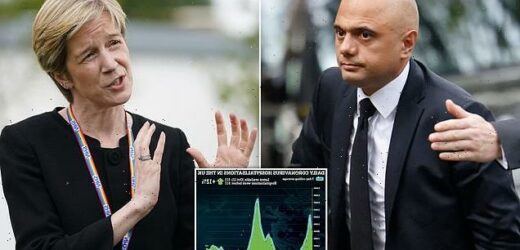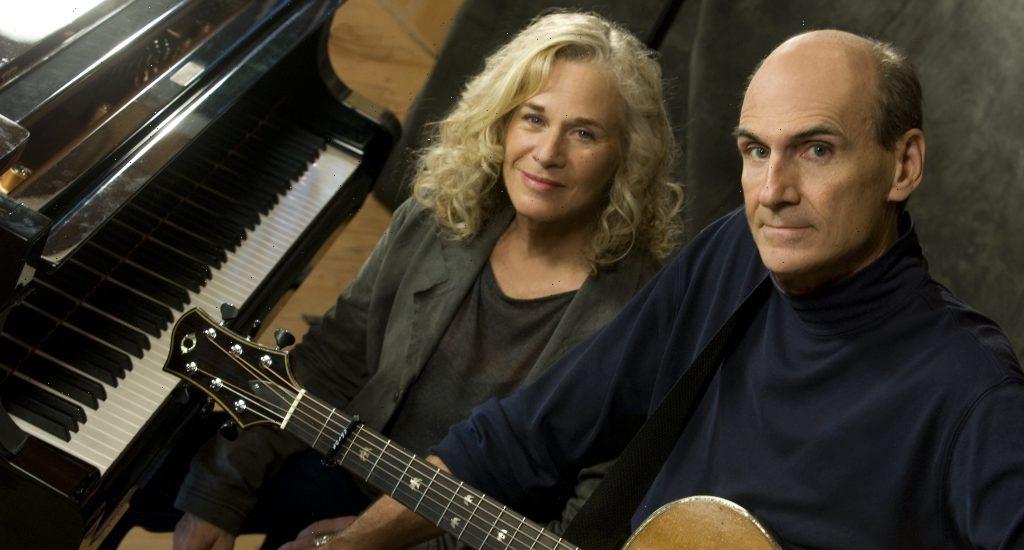NHS boss says health service was NEVER overwhelmed in fight against Covid but warns ‘tough winter’ will see thousands more hospital treatments cancelled
- Amanda Pritchard told MPs the NHS avoided being overwhelmed last winter
- She says the health service has not been overrun at anytime in the pandemic
- Sajid Javid told MPs there is ‘huge pressure’ on the health service in England
The head of the NHS today said the health service was never overwhelmed by Covid during the height of the pandemic.
Amanda Pritchard, chief executive of NHS England, told MPs expanding critical care, introducing new treatments and rolling out the vaccine prevented wards from being overrun over the last year-and-a-half.
However, medics who worked on the frontlines during the first and second waves of immediately slammed their boss, accusing her of ‘gaslighting’.
Mrs Pritchard also warned the NHS is on course for a ‘tough winter’ and that a rise in Covid-infected patients would have a knock-on effect on how much other, planned care could be carried out.
She suggested pressures on the health service could see thousands more hospital treatments cancelled. More than 1.5million NHS ops were cancelled or delayed due to the chaos of the pandemic.
Her comments were echoed by Health Secretary Sajid Javid, who told MPs there is ‘huge pressure’ on the health service in England.
Mr Javid admitted there are ‘shortages’ of 999 call handlers after ex Health Secretary Jeremy Hunt raised the issue in the House of Commons.
Meanwhile, paramedics also warned six-hour waits for ambulances could become ‘commonplace’ this winter.
The College of Paramedics claimed ambulances have been forced to wait outside of hospitals because of packed A&E wards, and warned that the problems will only get larger as winter demand picks up.
Meanwhile, Labour warned of a ‘winter crisis of misery for patients’.
Amanda Pritchard (right) told MPs expanding critical care, introducing new treatments and rolling out the vaccine prevented hospitals from becoming overrun over the last year-and-a-half. Sajid Javid (left) admitted there are ‘shortages’ of 999 call handlers after former Health Secretary Jeremy Hunt raised the issue in the House of Commons
Asked about her appointment during the Health and Social Care Select Committee, Mrs Pritchard said she was proud the health service avoided becoming overwhelmed at the height of the pandemic.
She said: ‘I’ve worked for the NHS for 20 years and I’ve been very proud to be part of the NHS and in fact never more so than in the last couple of years.
‘I think the report that your committee produced certainly caused me great pride in what the NHS has achieved over the last two years.
‘The way that critical care services were stood up and expanded, the speed of new treatments like dexamethasone, the rollout of the vaccine programme – all of which meant the NHS was not overwhelmed.
‘And we did see sadly that not every country was in that position.’
Her comments provoked fury from NHS nurses and doctors on social media, who claimed the NHS was overwhelmed even now.
Surgical nurse Sarah Angela said: ‘The NHS was overwhelmed before Covid. Covid made it worse. Now we’re dangling by a thread.’
And global health nurse Marc Robinson said: ‘Having worked as a nurse and led on wellbeing and phyiosological safety for the NHS during previous Covid waves I would beg to differ.
‘More Governmental gaslighting of hard working NHS staff.’
Six-hour ambulance waits to be ‘commonplace’ this winter
Patients waiting at least six hours for an ambulance will be ‘commonplace’ this winter, a paramedic has warned.
The UK faces a ‘bleak’ few months amid reports of increasing waits for A&E care. People who suffer heart attacks or strokes are likely to be the worst affected.
The warning comes as health services across the country experience four- to six-hour delays in getting to patients, increasing numbers of ambulances waiting outside hospitals and a backlog of 999 calls.
Richard Webber, a paramedic and spokesman for the College of Paramedics, said: ‘This issue has been bad for a while, hospitals have been so much busier.
‘Patients are being admitted and what’s happening is they cannot move them straight into A&E, so ambulances have become cabs waiting to unload outside hospitals.
‘Our members are reporting delays of four to six hours in getting to people, which means there can be up to 15 ambulances waiting outside hospitals with patients inside.
‘This also creates a backlog of 999 calls. I’m talking (about) up to 300 calls for a service to deal with, leaving people to wait at home potentially in need of serious medical attention.
‘Everything is therefore taking longer; staff are dealing with three or four incidents every shift, when they would usually do as many as eight.’
During the select committee meeting Mrs Pritchard was also questioned on whether the NHS has enough enough 999 call handlers.
Committee chair Mr Hunt said he had heard anecdotal reports of ‘very long periods of time being wasted for 999 calls to be picked up, sometimes as long as 10 minutes, which obviously if someone’s having a cardiac arrest is far too long’.
Mrs Amanda Pritchard said there had been a ‘very significant increase in demand’ and part of the answer was ‘the recruitment and training of additional call handlers to respond to that increase in demand’.
Pressed on the issue, she said ‘we do need to have more capacity in that call handling part of the process’.
She added: ‘It’s part of the £55million that we’ve given to ambulance services to help them now invest in additional resilience over the winter period.’
Speaking in the Commons after grilling Mrs Pritchard, Mr Hunt raised warnings about pressures in emergency care and a shortage of 999 call handlers.
Mr Javid replied: ‘There are shortages across the NHS — [Mr Hunt] has mentioned 999 callers, there’s a huge pressure at the moment on 111 calls as well and emergency care generally, including ambulance services.
‘There’s a significant amount of support that has been put in, especially over the last few months, especially additional funding and we are setting out in a detailed plan coming shortly — in the next couple of weeks — with the NHS exactly what more we will be doing.’
Elsewhere in the Commons, shadow health secretary Jon Ashworth highlighted lengthy waits for patients trying to secure a hospital bed and examples of ambulances backed up outside hospitals.
He said: ‘This is an NHS not just under pressure but an NHS under water. What is he personally going to do to avert a winter crisis of misery for patients?’
Mr Javid replied: ‘We can all see this wherever we live, our constituents are seeing this.
‘It is picking up over the winter and usually winters are tough for the NHS but this winter, I think, is going to be particularly tough and the Government has set out the reasons why.
‘The pandemic is still ongoing, this flu season will be particularly tough, I think, and that’s why we’re having, for example, the largest flu vaccination programme alongside the Covid programme this year.’
Mr Javid said extra money is being put into the NHS, before noting: ‘We are going to set out very shortly with the NHS a detailed programme for the winter and how we can better deal with the pressures.’
The UK faces a ‘bleak’ few months amid reports of increasing waits for A&E care. People who suffer heart attacks or strokes are likely to be the worst affected.
Around 3.7million third vaccines have been dished out to over-50s and the immuno-compromised in England as of Sunday (purple line), the latest date data is available for. But some 8.5million people are currently eligible for a booster dose, having received their second jab six months ago (green line). means 4.8million people may be suffering from waning immunity
Nearly 5MILLION vulnerable adults have yet to have their Covid booster vaccine
Nearly 5million vulnerable adults have yet to receive a Covid booster vaccine, official data shows after Downing Street admitted Britain faces a ‘challenging’ winter.
Despite the NHS top-up programme launching over a month ago, only around 3.7million out of the 8.5m eligible people in England have received the crucial third dose.
No10’s scientists approved plans to revaccinate all healthy over-50s, frontline health staff and carers and patients with underlying medical conditions six months after their second dose, after evidence showed it was the ‘sweet spot’ for immunity.
The lagging rollout has left around 4.8m people with sub-optimal immunity as the country moves into the colder months and faces the double threat of increasing case numbers and flu.
SAGE adviser ‘Professor Lockdown’ Neil Ferguson, an epidemiologist at Imperial College London, today insisted it was ‘critical we accelerate’ the booster drive to give ourselves the best chance of avoiding having to bring back curbs.
And Sir David King, who was the Government’s chief scientific adviser from 2000 to 2007, criticised the rollout for moving ‘extremely slowly’.
Amanda Pritchard, chief executive of the NHS, insisted the health service has ‘plenty of capacity’ to vaccinate all eligible people immediately but said people are not coming forward quickly enough. She told MPs on the Health Committee: ‘It’s really important that we now absolutely do get the message out that is Covid is still with us.’
Patients waiting at least six hours for an ambulance will be ‘commonplace’ this winter, a paramedic has warned.
The UK faces a ‘bleak’ few months amid reports of increasing waits for A&E care. People who suffer heart attacks or strokes are likely to be the worst affected.
Richard Webber, a paramedic and spokesman for the College of Paramedics, said: ‘This issue has been bad for a while, hospitals have been so much busier.
‘Patients are being admitted and what’s happening is they cannot move them straight into A&E, so ambulances have become cabs waiting to unload outside hospitals.
‘Our members are reporting delays of four to six hours in getting to people, which means there can be up to 15 ambulances waiting outside hospitals with patients inside.
‘This also creates a backlog of 999 calls. I’m talking (about) up to 300 calls for a service to deal with, leaving people to wait at home potentially in need of serious medical attention.
‘Everything is therefore taking longer; staff are dealing with three or four incidents every shift, when they would usually do as many as eight.’
Mr Webber said paramedics were often working three hours more than their shift and were having to travel further, leaving many ‘tired and burnt out’.
He said the West Midlands had been the worst-affected region, with waits for ambulances of over eight hours ‘not uncommon’.
An East Midlands Ambulance Service spokesperson described being under ‘sustained pressure’ since April, while the North East Ambulance Service reported losing around 120 hours to handover delays in one day.
On Tuesday, Lancashire Teaching Hospitals declared an ‘internal critical incident’ due to staffing shortages and overall demand for its services.
Mr Webber added: ‘There is a very long winter ahead for us, usually summer is seen as a respite, but this hasn’t been the case this time around so it’s going to feel like one very long winter.
‘I believe waits of six hours or more will become commonplace.
‘The ones who will be at risk are those left at home potentially injured but unassessed – those who suffer heart attacks and strokes will be even more at risk as there may not be a vehicle nearby to ensure patients get to specialist centres.
‘I would say at the moment we are where we usually are in January – in some cases the army is being brought in to support, so what will happen once we reach the peak of winter?
‘Winter respiratory problems will get worse – this is all still to come, which is proving to be quite a bleak picture.’
A West Midlands Ambulance Service spokesman said: ‘The whole of the NHS remains under severe pressure; hospital handover delays unfortunately mean patients waiting longer for an ambulance response.
‘We are working with all local NHS partners to reduce delays so crews can respond to the next incident as quickly as possible.’
Source: Read Full Article












